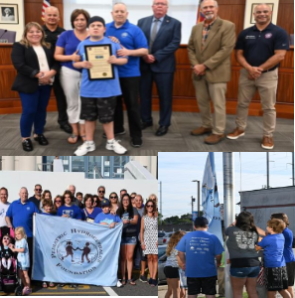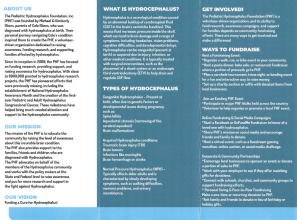PHF In the News: Luca’s Mom Organizes July 9 PHF Golf Tourney
July 2, 2013 by PHF
Filed under Uncategorized
Comments Off on PHF In the News: Luca’s Mom Organizes July 9 PHF Golf Tourney
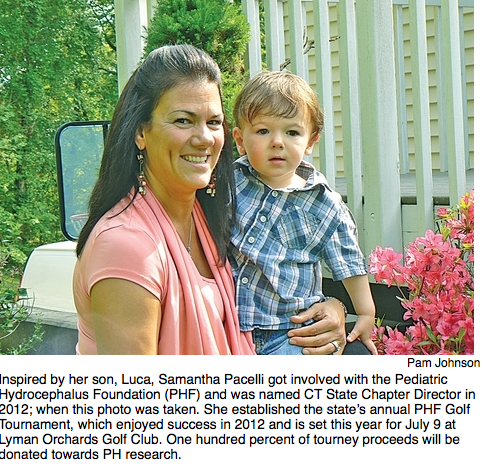 Samantha Pacelli’s handsome little boy Luca is among one in 500 newborns born with pediatric hydrocephalus (PH); a perilous condition more commonly known as “water on the brain.”
Samantha Pacelli’s handsome little boy Luca is among one in 500 newborns born with pediatric hydrocephalus (PH); a perilous condition more commonly known as “water on the brain.”
“Hydrocephalus is a lifelong brain condition where cerebral fluid builds up in the brain, typically in young children, enlarging the head and sometimes causing brain damage,” said the North Branford resident.
Named Connecticut State Chapter Director for the Pediatric Hydrocephalus Foundation (PHF) in 2012, Pacelli established the very successful PHF golf tourney that same year. Now, she’s seeking support for the second annual PHF Golf Tournament, coming July 9.
Last year, 140 golf tourney participants and numerous sponsors (including Kids for Kids, United Insurance Group, Boyle Family, and many other business and personal supporters), helped Pacelli raise over $12,000 towards hydrocephalus research taking place at Children’s Boston Medical Center and Yale University Neurology Department. This year, Pacelli is hoping for 200 tourney participants, and seeks to raise $20,000.
The tournament will take place Tues. July 9 at the beautiful Lyman Orchards Golf Club in Middlefield. A $165 per player fee includes green fees, cart, luncheon with beer and wine. For non-golfers, Pacelli offers a luncheon-only option ($50 per person).
One hundred percent of event proceeds benefit efforts of PHF, a 501 (c) (3) organization providing support, education and advocacy for individuals, families and medical professional dealing with the complex issues of hydrocephalus.
PHF is committed to increasing awareness and research on the diagnoses and treatment of hydrocephalus and bringing it to the forefront of public attention. It’s a priority for everyone touched by this condition, because right now, there is no cure, said Pacelli.
“The standard treatment is surgical implantation of a shunt. Averages of 40,000 shunt operations are performed each year in this country. Due to the lack of advancements in treatment methods, many people with hydrocephalus are unable to lead full and productive lives,” she said.
For more information on the July 9 PHF Golf Tournament, including registration and sponsorship, contact Pacelli at (203) 710-1031 or by email at hydrocephhope@aol.com
PHF In the News: PHF Pennsylvania Presented With Donation Check
June 12, 2013 by PHF
Filed under Uncategorized
Comments Off on PHF In the News: PHF Pennsylvania Presented With Donation Check
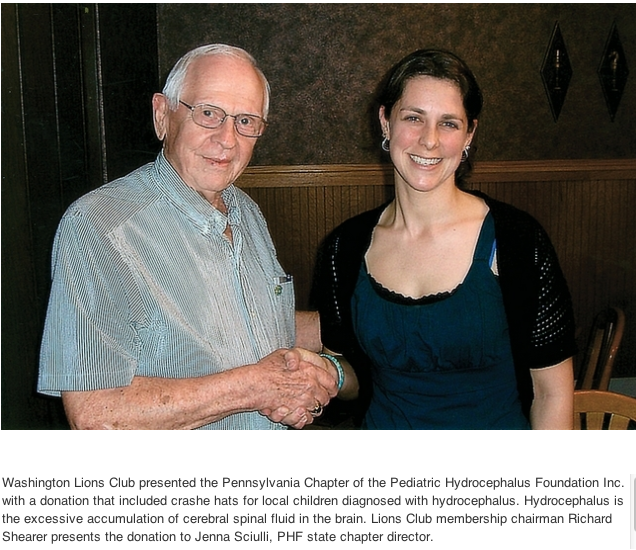
Source: Observer-Reporter
PHF In The News: ‘Something wasn’t clicking’ Macomb girl’s family shares effect of condition
May 23, 2013 by PHF
Filed under Uncategorized
Comments Off on PHF In The News: ‘Something wasn’t clicking’ Macomb girl’s family shares effect of condition
 MACOMB —
MACOMB —
 When Carol Jackson took her then 9-month-old daughter, Delaney, to the pediatrician for a regular check-up, she had the suspicion that something might be wrong.
When Carol Jackson took her then 9-month-old daughter, Delaney, to the pediatrician for a regular check-up, she had the suspicion that something might be wrong.
“Before that I kind of knew she wasn’t hitting the milestones,” Carol recently recalled while holding the now nearly 3-year-old Delaney on her lap.
A typical, happy little girl with a bright smile, Delaney wears her blond hair in pigtails and likes to show off her purple tennis shoes. But at 9 months old, the Macomb girl wasn’t developing the motor skills of other children her age and her legs were often shaky.
Delaney’s pediatrician at McDonough District Hospital ordered an MRI brain scan, which showed excessive fluid in the little girl’s brain.
Hydrocephalus, a condition in which excessive fluid builds up in the brain and causes pressure, had been causing Delaney’s delayed motor skill development and shaky legs.
She underwent emergency surgery at St. John’s Hospital in Springfield to drain the fluid and relieve the pressure on her brain. Doctors implanted a plastic shunt in Delaney’s brain to direct away the excess fluid away.
In February 2012, Delaney underwent revision surgery to replace the shunt. In October, Delaney also got an infection from her shunt and spent a month at St. Francis Hospital in Peoria.
“It was all so fast,” Carol says about the time period from the first visit to the pediatrician to the first surgery. “We knew something wasn’t clicking. It was just a whirlwind.”
The facts
According to the Pediatric Hydrocephalus Foundation, the condition affects more than one million Americans — from newborns to senior citizens — and an average of 40,000 shunt surgeries are performed in the U.S. each year.
Little is known about what causes the condition, and there has been almost no advancement in the treatment of Hydrocephalus.
While surgery to implant a shunt is the most effective treatment for Hydrocephalus, the shunts often fail or cause infections, just as it happened with Delaney.
“Hydrocephalus is like the most common brain surgery in children,” Carol said, “but a lot of time within the first year half the shunts fail, and that’s why I think they need to do more research.”
The shunts include a valve that is implanted behind an ear and a tube that extends through the body to direct fluid away from the brain.
Dr. Mary Kathleen Lockard is Delaney’s pediatrician at McDonough District Hospital and has treated others with the condition. She said there are signs and symptoms parents can look for in pediatric Hydrocephalus.
“If there is an enlarged head, or the head is growing more rapidly, that is something to look for,” she said. “We look for developmental delays as well, such as not crawling or sitting up. Those are the big things we look for. Also a loss of motor skill or headaches, but the head size and rate of development would be the biggest things.”
Lockard said it can difficult to determine what causes Hydrocephalus.
“It can be related to something that happened during prenatal development or something after birth,” she said. “In her (Delaney’s) case, we don’t know if it was something that was already there.”
The cause
Today, physical and speech therapy are helping Delaney maintain her motor skills.
But Hydrocephalus is a condition she will live with the rest of her life.
For support and to learn more about the condition, Carol reached out to the Pediatric Hydrocephalus Foundation and became that organization’s Illinois event coordinator. The nonprofit, 501(c) foundation is run by volunteers.
“I wanted do something,” Carol said. “I wanted something positive to come out of all this. I wanted people to be aware of what Hydrocephalus is, because we didn’t really know what it was.”
Carol, who works as a reading specialist with Macomb CUSD #185, hopes to continue raising awareness about Hydrocephalus. She is organizing a 5K fun run and walk for the Pediatric Hydrocephalus Foundation. The event will kick off at 9 a.m. on Saturday, Sept. 14, at the Old Dairy restaurant. All proceeds will go to the foundation. To register for the event, visit www.active.com/donate/phfrunil2013 or email Carol at carol@hydrocephaluskids.org.
Registration for adults 18 and older is $25 and $10 for children. A race t-shirt is included.
“Face of a Foundation”: Bakersfield Boy Named National Face of Hydrocephalus Awareness
March 26, 2013 by PHF
Filed under Uncategorized
Comments Off on “Face of a Foundation”: Bakersfield Boy Named National Face of Hydrocephalus Awareness
Matthew Elicea, one half of the PHF’s “National Face of Hydrocephalus Awareness” winners, was featured in a TV Interview on California’s KGET-TV Channel 17.
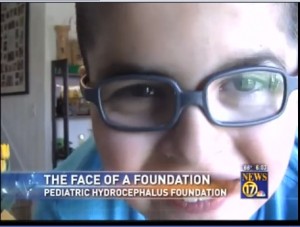
Mother Starts Hydrocephalus Support Group
March 21, 2013 by PHF
Filed under Uncategorized
Comments Off on Mother Starts Hydrocephalus Support Group
 For years, 15-year-old Lauryn Freeman battled painful migraines and headaches.
For years, 15-year-old Lauryn Freeman battled painful migraines and headaches.
“It’s like stabbing you in your head. For migraines it’s horrible, and I went to the emergency room countless times,” Lauryn Freeman said.
Lauryn learned last year that these were more than painful headaches. A Cat scan revealed a large amount of water on her brain, and she was diagnosed with Hydrocephalus.
“I knew what it was, I knew what to expect, I knew how hard it could be so I was devastated,” Lauryn’s mother Rebekah Wright said.
Hydrocephalus, also known as “Water-head” is when spinal fluid that is normally in your head builds up and it’s not able to drain. Treatment for Lauryn meant having surgery to get a shunt put into her head.
“By putting the shunt in place, you can actually set it so the pressure will be where you want it to be at, for that to actually let spinal fluid drain. So the pressure won’t get too high in her head and cause further damage in terms of brain injury or complications such as headaches or vision changes,” Lauryn’s doctor, Pediatric Neurologist Dr. John Flatt said.
Since her diagnosis, Lauryn’s mother has started the first Pediatric Hydrocephalus Foundation chapter in Louisiana. She’s currently organizing its first fundraiser, and it will be held March 27th at the Icegators’ playoff game. If you use the code “Ice” you get tickets to the game for 10 dollars, and one dollar from each ticket will be donated to the organization.
“I hope this support group helps other kids with Hydrocephalus to find someone they can share their story and feel comfort, and know that they’re not the only ones going through this,” Lauryn said.
 Read more at: https://html.com/attributes/img-width/>
Read more at: https://html.com/attributes/img-width/>











